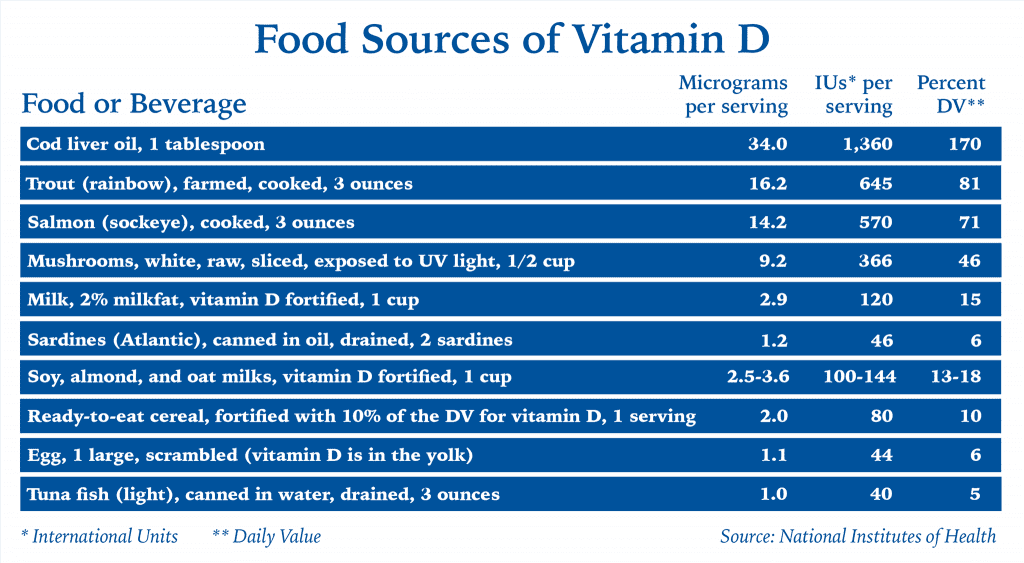Lately, vitamin D has been enjoying a moment in the sun as researchers discover more and more health benefits it may offer. At the same time, vitamin D deficiency is common in the United States, even in healthy, young adults.
The solution is simple — and it isn’t the sun.
The health benefits of vitamin D
A fat-soluble vitamin, D promotes bone health by increasing calcium absorption in the intestines and regulating levels of calcium and phosphate. But it does much more. Vitamin D modifies the body’s immune responses, regulates specific metabolic activities and plays a role in managing inflammation. Some evidence suggests vitamin D may help guard against or fight certain cancers and diabetes. Supplementing with vitamin D may improve symptoms of depression, especially in people whose levels are low.
Interesting fact: While vitamin D has “vitamin” in its name, it’s technically a prohormone, a substance the body converts to a hormone. The hormone D becomes is a type of steroid.
Lack of vitamin D could contribute to a person’s susceptibility to viral respiratory infections and lung diseases, though a cause-and-effect relationship hasn’t been proven. Some experts have theorized that increased exposure to the sun’s UV rays was the reason tuberculosis patients benefited from sanitoriums.
More recently, during the coronavirus pandemic, researchers have speculated that healthy levels of vitamin D might benefit COVID-19 patients. They noted a correlation between low vitamin D levels and higher mortality from the virus. It could be that vitamin D helps prevent an immune system overreaction that leads to a cytokine storm, in which the body attacks its own tissues.
Natural sources of vitamin D
Don’t count on getting all the vitamin D you need from food. Most foods, other than fatty fish, are poor sources of vitamin D, unless they have been fortified. Foods and beverages often fortified with D include dairy milk, soy milk, orange juice, margarine and cereal.

Certain people should avoid it altogether.
The richest natural source of vitamin D — specifically the form known as vitamin D3 — comes not from the ground but from the sky. UVB rays from the sun, which penetrate the outer layers of exposed skin, prompt the body to make vitamin D. It’s not called the “sunshine vitamin” for nothing.
How much vitamin D can you get from the sun? That depends on where you live, the season, the time of day and your skin color. Getting a sufficient daily dose could take as little as 15 minutes, or considerably longer. At some latitudes, it’s almost impossible to get adequate vitamin D from the sun, except in summer. As we age, it becomes harder to make D from sunlight.
What level of sun exposure is safe?
Here’s the real problem with getting vitamin D from the sun: Exposure to UV rays significantly increases a person’s risk of skin cancer — so much so, in fact, that the American Academy of Dermatology and the American Cancer Society both advise against getting any unprotected sun exposure. While 15 minutes a day might seem harmless, damage to the DNA from UV rays builds up over time. Eventually, when the scales tip, the result is skin cell mutations that lead to skin cancer.
The intensity of the sun matters as well as the length of exposure. In places where the sun’s rays are strong year-round, such as Florida, damage can occur more quickly.
How can I get enough vitamin D?
Assuming you’re practicing sun safety by wearing a broad-spectrum sunscreen with an SPF of at least 30, seeking shade and covering up, your doctor may advise you to take a vitamin D supplement in addition to consuming fortified foods and beverages.
Vitamin D3 is generally considered the preferred form of supplement. The recommended dietary allowance for adults up to age 70 is 600 IU. For adults over the age of 70, it jumps to 800 IU. Certain people may need to take more. If you have osteoporosis or any risk factors for vitamin D deficiency, your doctor may want to check your vitamin D levels with a blood test.
As with most supplements, more is not better. It’s very possible to take too much vitamin D, which can be toxic at high doses. The Institute of Medicine of The National Academies suggests a tolerable upper intake level of 4,000 IU per day. Most people need far less.
The bottom line: Don’t get your sunshine vitamin from the sun. Get it from oily fish, supplements and fortified foods and beverages.
Article Written By: Marianne Wait, an award-winning health and wellness writer based in New Jersey.






